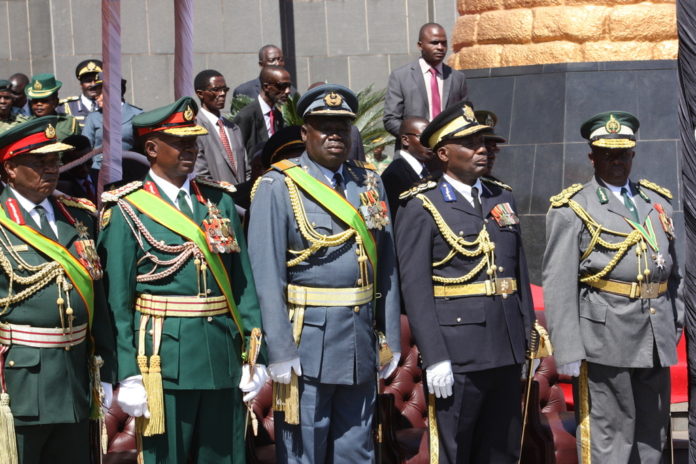MARANDA, May 19 — 46-year old Livious Nhundugwa of Maranda township in Zimbabwe’s Mwenezi district and his one-time friend, 43-year old Taguta Chikondo, are now sworn enemies despite the two belonging to the country’s ruling Zimbabwe Africa National Union Patriotic Front (Zanu-PF).
On 16 April this year, the two staunch Zanu-PF supporters exchanged blows at the remote township in their village, drawing a sizable crowd that was apparently surprised to witness the two die-hard Zanu-PF supporters pounding one another savagely.
What sparked their brawl was an argument about corruption which the former-Nhundugwa, blamed on party stalwarts, with the later-Chikondo having none of it, rather pinning the blame on the country’s biggest opposition party, the Movement for Democratic Change Alliance (MDC Alliance).
“You are getting lost, I know you want to stray to MDC Alliance,” Nhundugwa shouted at the top of his voice in the midst of his argument with Chikondo.
“MDC brought sanctions to our country,” added Nhundugwa.
But, irate and impatient, Chikondo would have none of it.
“Everyone knows here that Zanu-PF leaders are corrupt and have kept us in this economic messy over the years stealing from us; we vote them into power because they have managed to sustainably lie to us, but this won’t last,” Chikondo told Ubuntu Times later after his brawl with Nhundugwa which was broken up by onlookers.
Yet, as the two little known Zanu-PF backers traded blows deep in this remote district, further up in Harare, just a week ago, the Zanu-PF government could not conceal the internal fights among government officials.

Zimbabwe’s shortest-serving Deputy Minister of Information, Energy Mutodi recently came out on Tweeter claiming that he is living in fear following his public rebuke by Zimbabwe’s foreign affairs minister, who distanced the government from statements he (Mutodi) made on Twitter, suggesting that Tanzanian president John Magufuli is struggling to contain the Coronavirus crisis in the East African country.
Mutodi had said ‘living in fear of the Chris Mutsvangwa-SB Moyo coalition. I hope it won’t resort to wartime tactics. Appealing for prayers.’
Mutsvangwa is a Zanu-PF politburo member, also former advisor in the Zimbabwean President Emmerson Mnangagwa’s office, thought to be aligned to a Zanu-PF faction that include officials like Foreign Affairs Minister Sibusiso Moyo, a former army chief in this Southern African country.
Apparently sounding the triumph of the military factor in the Zanu-PF government, on the evening of May 20, Zimbabwe’s Minister Mutodi was dismissed from his government post although reasons of his expulsion were not mentioned by a government statement.
As ordinary Zanu-PF supporters like Nhundugwa and Chikondo fall out in typical fights that have apparently rocked the upper echelons of power in the Zanu-PF government, like in the days of former President Robert Mugabe, fresh divisions have erupted again, hitting Zimbabwe’s government harder.

But, Zimbabwe’s ruling party officials like Tafadzwa Mugwadi, have denied the existence of the political infighting, dismissing these as imaginary rather.
“I would not have wanted to comment on ordinary disagreements involving two government officials, but whatever their differences are, they have no bearing on Zanu-PF at all and do not reflect anything about ZANU-PF. Factionalism only exists in small minds,” Mugwadi who is the Zanu-PF Information director, told Ubuntu Times.
“There is no factionalism in Zanu-PF, rather, it exists at the house next door among the opposition,” added Mugwadi.
The divisions that have visited the Zanu-PF government in Zimbabwe are not new here.

Former late Zimbabwean President Robert Mugabe was also ridden with divisions that eventually led to his ouster in a military-led coup in November 2017.
During Mugabe’s reign, two factions wrestled to succeed him—the Lacoste Faction which was linked to the army and the G-40, Generation 40, which was aligned to the then First Lady, Mrs. Grace Mugabe who battled it out then with the current President to succeed her geriatric husband.
Now, to ordinary anti-government activists here like Melinda Manwere, it seems history is fast repeating itself in Zimbabwe.
“The military factor keeps resurfacing here forming another faction yet again to fight Mnangagwa just as it did when it ousted Mugabe,” Manwere told Ubuntu Times.

Even media experts like Rashweat Mukundu see nothing new about Zanu-PF factionalism resurfacing in the Zimbabwean government.
“The ruling party has never been cohesive post the coup more importantly over divisions on sharing spoils of the coup inclusive of mining rights, tenders, and other business deals; the latest spat between Mutodi and Moyo is not over ideological or political differences, but control of state resources more so a growing sense with some that Mnangagwa has monopolized the state with the support of a few individuals. And others feel edged out from the feeding trough,” Mukundu, who is the Africa Adviser at International Media Support (IMS), told Ubuntu Times.
Although both are top Zimbabwean government officials, typifying the deep divisions besetting the Zanu-PF government, the country’s Foreign Affairs Minister had hit back at the country’s Deputy Information Minister, Mutodi via Twitter.
“Mutodi’s remarks did not represent the views of the Zimbabwean government,” Moyo had said.

